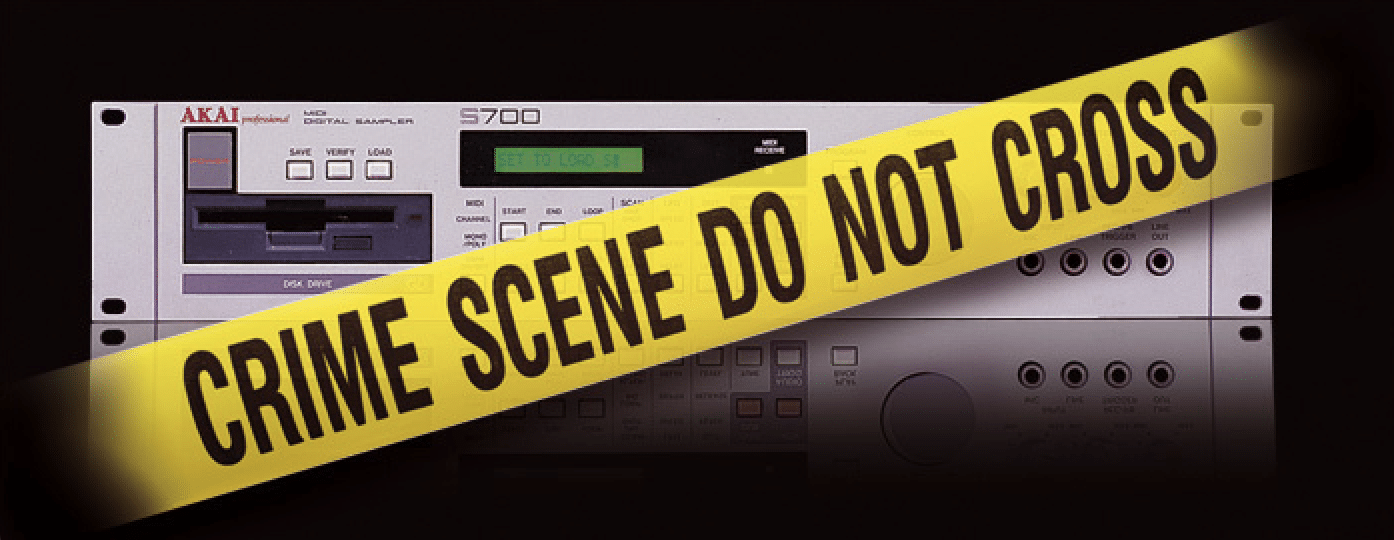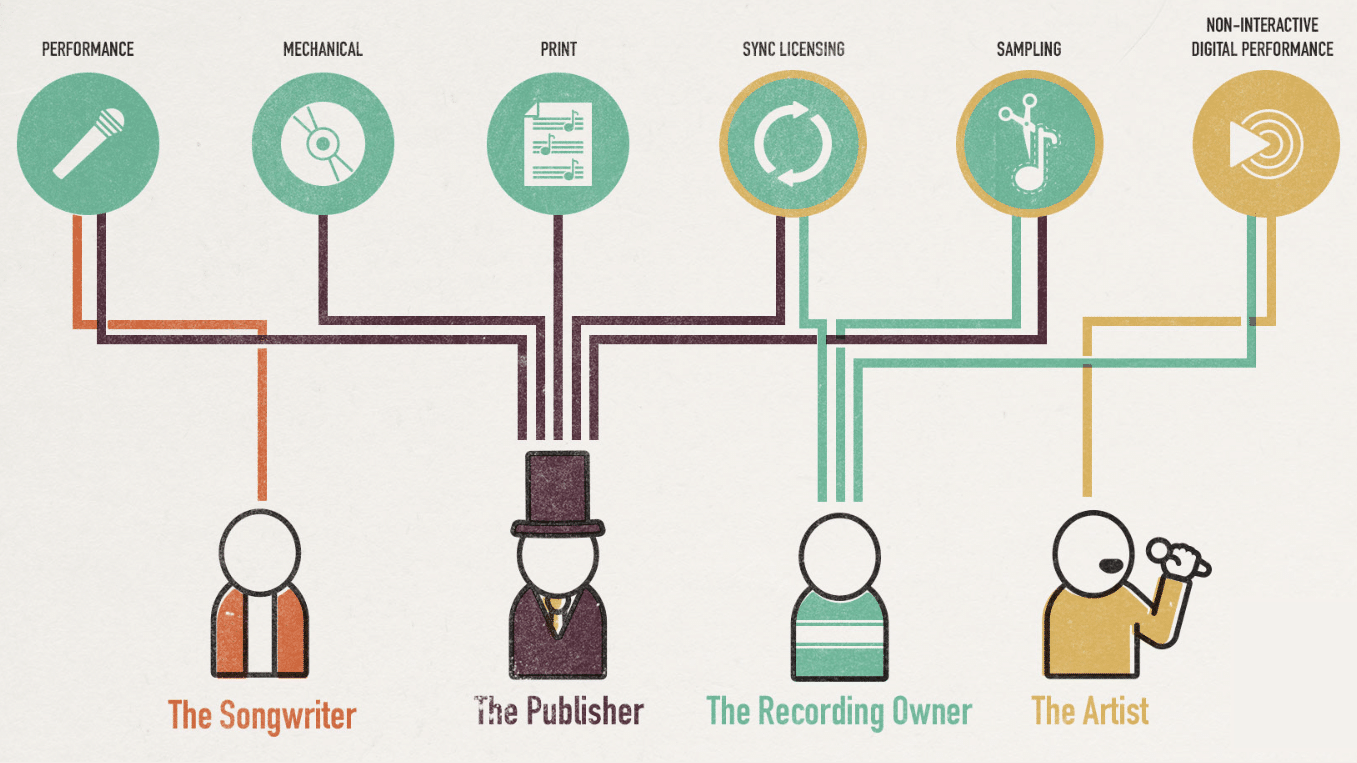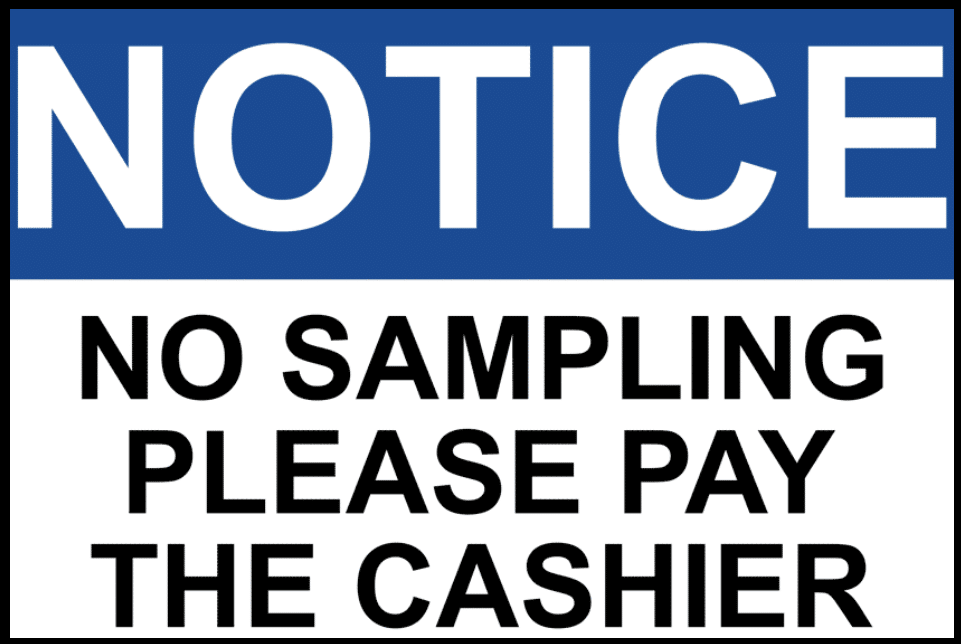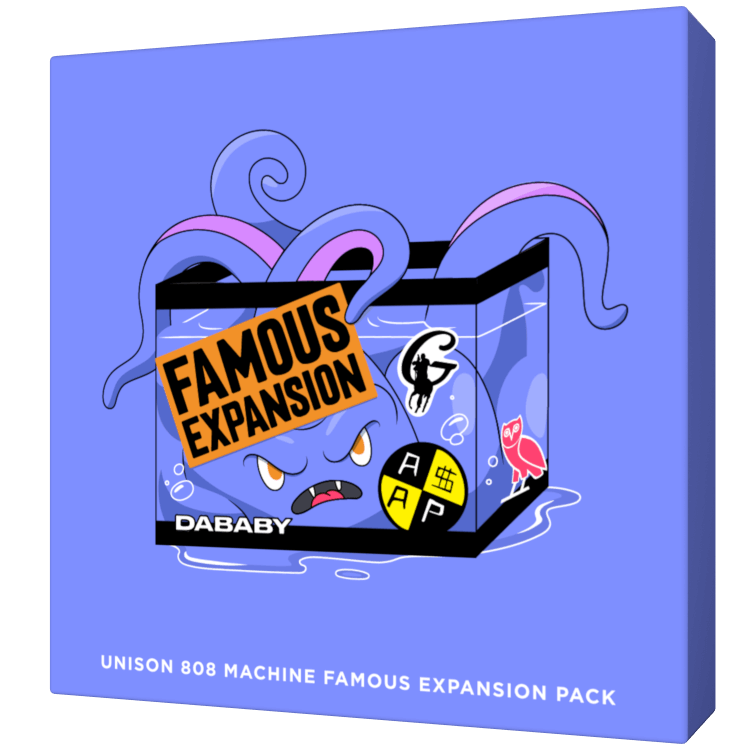In the world of music production, nothing stirs up excitement (and caution) quite like the topic of sample clearance.
It’s like navigating a minefield 一 one where the mines are potential legal battles, and the safe paths are the correct clearance processes.
With the rise of hip-hop and electronic music, sampling has become an integral part of the industry.
However, without proper knowledge of sample clearance, you might find yourself in a labyrinth of legal trouble.
Luckily, we’ve got you covered!
In today’s article, we’ll be breaking down:
- Understanding what sample clearance is & why it’s essential in music production ✓
- Copyright owners, master recording owners, and music publishers ✓
- Familiarizing with terms like ‘No Sampling Policy’ ✓
- How to clear a sample step-by-step ✓
- Obtaining sample clearance the right way ✓
- Grasping the concept of sampling music and its effects ✓
- Learning about different clearance scenarios ✓
- Understanding the potential legal troubles & how to prevent them ✓
- Expert tips, tricks, and sample clearance techniques ✓
Remember, while it may seem like a tiny little formality, ignoring the impact of sample clearance can get you in some deep waters, so don’t take it lightly.
But, with this article as your guide, you won’t need to worry.
Let’s dive in…
Table of Contents
- An Introduction to Sample Clearance
- Understanding the Basics: Master Recording & Sampling Music
- How to Clear a Sample: The Art of Obtaining Permission for Sampling
- Navigating the Music Publisher Landscape
- Mastering Your Own Music: Independent Artist’s Guide to Sample Clearances
- Beyond the Clearance: Preparing Your New Song for Streaming Platforms
- Ensuring Success: Final Tips for Independent Artists
- Sample Clearance: Final Thoughts
An Introduction to Sample Clearance

Sample clearance is not a mere formality… it’s a crucial step that stands between your music project and the broader music industry.
It’s the process of seeking permission from the rights holders (both the owner of the master recording and the copyright owner of the original song) to use a portion of their music in your new song.
Every time you sample music, whether it’s a beat, a melody, or even a tiny section of an artist’s song, you’re required to clear the sample.
Not just because it’s ethical or ‘the right thing to do,’ but because it’s legally required.
This is the bedrock of music copyright law.
And as I like to say, when it comes to sampling 一 it’s better to ask for permission than forgiveness.
-
The Legal Side of Sampling Music

Let’s get into the nitty-gritty: the legal side of things.
When you’re sampling music, there are two primary types of rights to consider:
- The rights to the actual recorded audio (the master recording)
- The rights to the underlying composition (the song itself, including the lyrics and melody).
The copyright owners of these are usually different entities.
Typically, the record label owns the master recording 一 while the music publisher owns the rights to the underlying composition.
This is where the process of obtaining sample clearance starts to get complex.
Both the master recording owner and the copyright owner of the original song need to grant you permission to use their music.
And trust me, obtaining permission is unfortunately not as simple as shooting off an email.
It’s a process that demands patience, diplomacy, and sometimes, even negotiating skills.
Before you say, “Hey, it’s just a small sample, no one’s going to notice,” let me stop you right there.
While it’s true that some artists sneak under the radar, remember that copyright law applies regardless of the length of the sample.
If the original recording is identifiable in your track, it’s best to clear the sample, period.
Let’s not forget the legal and financial consequences of copyright infringement.
And believe me, as an independent artist, you don’t want to get tangled up in that mess.
So, it’s better to just stick with the legal route, and save this article for later in order to make sure you thoroughly understand both the process and ramifications.
Understanding the Basics: Master Recording & Sampling Music
Now that we’ve established the importance of sample clearance let’s dive deeper into the concepts of master recording and sampling music.
What is a Master Recording?

When you hear the term ‘master recording,’ it refers to the original, final mix of a track 一 It’s the source music you’ll use when sampling.
The master recording is the unique product of an artist’s creative process, carefully crafted and polished in the studio.
This is different from the underlying composition, which refers to the music and lyrics that make up a song.
The master recording owner has exclusive rights over that recording.
This includes the right to:
- Reproduce it
- Distribute it
- Approve or deny any sample requests
Therefore, to use a sample from a master recording, you must obtain sample clearance from the master recording owner.
If you don’t, it could lead down an ugly road (just ask Lil’ Nas X).
Sampling Music: A Modern Trend in the Music Industry

Sampling music, in the simplest terms, is the act of taking a portion of one sound recording and reusing it in a different song.
This can range from lifting a short section of a drum pattern to a vocal phrase or an entire chorus.
In genres like hip-hop, dance, and EDM, sampling is a true staple.
It’s a way to pay homage to the past, build upon the work of previous artists, and create something new and unique.
Sampling isn’t just about cutting and pasting audio clips 一 it’s an art form in its own right.
But just like any other art form, it’s subject to laws and regulations…
That’s where the process of clearing samples comes into play.
How to Clear a Sample: The Art of Obtaining Permission for Sampling
Now, let’s get to the main event: how do you actually clear a sample?
It might seem daunting, but with a little know-how, you can navigate this process with confidence.
-
Starting With the Original Recording

When you’ve found the perfect sample to use in your own music, your first step should always be to identify the original recording and the master recording owner.
This might seem obvious, but sometimes, songs have been covered and re-recorded multiple times (think cover song).
Therefore, it’s important to make sure you’re approaching the right master recording owner.
Doing a quick Google search or checking online record stores could help you get this information.
-
Who to Contact: Artist’s Song, Copyright Owner, or Music Publisher?

To obtain sample clearance, you’ll need to reach out to both the master owner and the copyright owner of the song.
Remember, these might not always be the same person(s).
Often, the master recording is owned by the record label 一 while the underlying composition’s rights are held by the music publisher or the artist directly.
It’s also worth noting that some artists and record labels have a ‘no-sampling policy,’ so make sure to check this before proceeding.
If that’s the case, you may need to reconsider your choice or opt for music re-records lyrics to avoid infringing on copyright laws.
-
Clearing Samples: The Process & Possible Hurdles

The process of clearing a sample isn’t always straightforward.
The owners may even request to listen to your new song to decide if they want their music associated with it.
Be prepared for prolonged financial negotiations as well.
NOTE: Some rights holders might request an upfront fee or a percentage of the profits your song makes.
Also, the clearance process can sometimes be lengthy.
It’s not uncommon for the process to take weeks or even months, so make sure to factor this into your project timeline.
And especially before you start polishing your track and adding effects like reverb, comb filtering, multiband compression, or phasing.
Understanding the dynamics between artists, copyright owners, and music publishers is a crucial aspect of sampling, so let’s dive deeper…
-
No Sampling Policy

Some record labels have a no-sampling policy (discussed above).
Meaning, they simply don’t allow their artists’ songs to be sampled, no matter what.
Therefore, it’s essential to check the record label’s policy before spending too much time on a song that you won’t be able to use.
You wouldn’t want to invest time and resources in creating a new song only to realize you can’t release it, because that’s just devastating.
If you’re dealing with a record label that has a no-sampling policy, one possible workaround is to re-record the parts of the song you want to use.
This is known as ‘musician re-records lyrics,’ and it involves creating a new recording of the original song 一 thereby bypassing the need for permission from the master recording owner.
-
Check Online Record Stores & Sampling Consultants

The vast array of online record stores can be a treasure trove of sampling material.
They often include information about:
- The record label
- Music publisher
- Sometimes even contact information for obtaining permission
It’s a great place to start your clearance process.
If you’re finding the clearance process challenging, it might be worth hiring sampling consultants.
They specialize in this field and can guide you through the process, helping you avoid any legal pitfalls along the way.
Mastering Your Own Music: Independent Artist’s Guide to Sample Clearances
Finally, let’s bring it all home and look at how you (as an independent artist) can master the art of sample clearances.
Legal Issues & Copyright Infringement

Whether you’re just starting out in the music business or you’re a seasoned independent artist, it’s crucial to understand the legal implications of sampling.
Not only can it save you from potential legal trouble, but it also ensures you respect the rights of other artists.
Clearing samples is not a step to skip or take lightly.
Regardless of whether you think your sample is unrecognizable or the source song is obscure, always follow the proper channels to obtain sample clearance.
This keeps your music above board and protects your artistic integrity.
Seeking Permission From the Master Recording Owner

As an independent artist/music producer, approaching the master recording owner might seem intimidating.
But remember, people in the music industry, or a record company are just that – people.
They’re passionate about music just like you, and many understand the importance of sampling in today’s music landscape.
When you reach out to them:
- Be clear about your intentions
- Respectful of their rights
- Open to their conditions
By doing so, you’ll have a much better chance of obtaining the rights and building a lasting (beneficial) new friendship.
Who knows, you might want to seek permission for another one of their pieces, so it’s always a good idea to make connections whenever possible.
Beyond the Clearance: Preparing Your New Song for Streaming Platforms

Once you’ve successfully navigated the clearance process, it’s time to prepare your track for streaming platforms.
NOTE: Different platforms may have varying requirements and procedures, so make sure to check the specific streaming platform you’re uploading to in order to ensure your song fits within the accepted file formats and quality standards.
Don’t forget to pay attention to the metadata as well.
This includes things like:
- Your artist name
- Song title
- Genre
- Etc.
Proper metadata ensures your track is correctly indexed and easy for your fans to find.
Streaming platforms are saturated with music, so think about how you can make your new song stand out.
Maybe it’s through captivating cover art, online hype, or even a behind-the-scenes video.
Be creative and give your audience a reason to press play.
Ensuring Success: Final Tips for Independent Artists

Don’t be disheartened if you encounter obstacles in your sample clearance journey.
Some rights holders might say no, or ask for a fee that’s beyond your budget, but don’t be discouraged 一 it’s all part of the music business.
Use these experiences as opportunities to grow and learn. And remember, there’s a vast library of music out there.
If one sample doesn’t work out, there’s always another that might be the perfect fit for your track.
Moreover, if you’re frequently sampling, consider creating relationships with record labels and publishing companies.
Becoming a familiar face in their inbox can streamline your future clearance processes and even open doors for collaborations.
Lastly, never forget why you started making music.
Stay true to your sound, keep your passion alive, and respect the craft.
The process of obtaining sample clearance can be a challenging part of the music industry.
However, it’s also an opportunity to learn about the intricate workings of the business and create ethically/legally sound music.
1. Always Keep a Record
Keeping a record of your clearance process is more than just good organization; it’s a vital step that can protect you in the long run.
Each email correspondence, each signed agreement, and each payment receipt serves as evidence of your due diligence and respect for copyright law.
But it’s not enough to just have these documents 一 you need to keep them safe and accessible.
Consider using a cloud storage service or a dedicated external drive for this purpose.
This ensures that even if your computer crashes or your physical copies are lost, your important documents remain intact.
Moreover, a well-documented clearance process can also be a learning tool.
Reviewing past communications and negotiations can provide valuable insights for future clearances.
This helps you to continuously refine your approach and become more efficient in navigating the clearance process.
2. When to Hire Sampling Consultants
As much as this guide aims to empower you with knowledge, there will be instances when professional advice is necessary.
Navigating legal jargon, negotiating clearance fees, or dealing with complex copyright issues are situations where sampling consultants can be invaluable.
Sampling consultants are experienced in the ins & outs of music clearance.
They can help you:
- Understand contracts
- Guarantee fair negotiations
- Expedite the clearance process in some cases
It’s an investment that can save you time and potential legal trouble down the line.
However, hiring a consultant doesn’t mean you can sit back and let them do all the work.
Stay involved in the process, ask questions, and seek clarifications.
This not only helps you stay informed about your project but also deepens your understanding of the music industry.
3. Ensuring Your Work is Legally Sound
In the music industry, your reputation is everything. And part of maintaining a good reputation is ensuring your work is legally sound.
This means:
- Obtaining proper sample clearances
- Respecting copyright laws
- Understanding your rights & responsibilities as an artist
When your work is legally sound, you can confidently share it with the world, knowing that you’ve done the right thing.
It sends a message to other artists, record labels, and music publishers that you’re a professional who respects the craft and the legal frameworks that protect it.
This not only protects you from potential legal trouble but also fosters trust and credibility within the industry.
Also, remember that each clearance process is an opportunity to build relationships.
From the master recording owner to the copyright owner, each person you interact with is a potential connection.
Treat each interaction with respect and professionalism, and you might find doors opening for you in the future.
Lastly, keep in mind that while legal processes are crucial, they should never overshadow your creativity.
Laws and regulations serve to protect and structure, but at the end of the day, music is about expression and connection 一 stay informed, do the right thing, and keep creating music that moves you.
Sample Clearance: Final Thoughts
Well, there you have it, the intricate world of sample clearancing.
We’ve highlighted the importance of obtaining permissions, covered copyright laws, and emphasized your due diligence as a music producer.
No doubt, sample clearance can be a challenging process… but it’s a crucial part of the journey.
It helps you to become a more knowledgeable and responsible artist.
However, I understand as a fellow music producer, that sometimes you just want to focus on creating without the worry of legal procedures.
That’s where this professionally-crafted, completely free Black Friday pack, which contains epic samples, loops, templates, one-shots, vocals, and so much more.
And the best part: it’s ALL royalty- and copyright-free!
Imagine having an array of sounds at your fingertips, ready to be woven into your next big hit, without worrying about going through the clearance process.
By using this extensive free pack, you’ll not only save valuable time but avoid potential legal trouble as well.
You’re free to experiment, blend, and create amazing music 一 knowing that all the samples have been cleared for you to use and enjoy however you’d like.
In the dynamic world of music production, where creativity meets technology, remember to have fun and remain respectful of others’ work.
So, whether you’re clearing samples or using royalty-free packs like this one, the goal remains the same; to create compelling, unique music that resonates with you & your audience.
Until next time…







Leave a Reply
You must belogged in to post a comment.